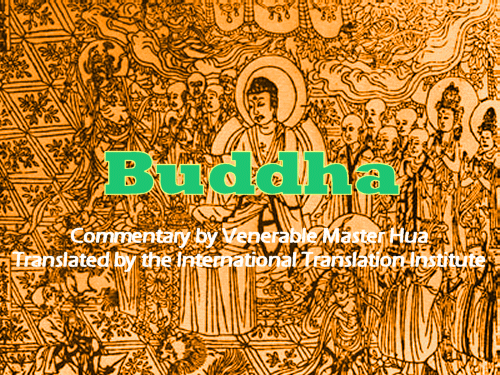|
 "Buddha"
is half a Sanskrit word. The full word is "Buddhaya." Chinese
usually like to abbreviate words, so it was shortened to two, "Buddha."
Chinese know this word "Buddha, " but they are unable to explain
it if asked. "Buddha" means enlightenment. There are three
kinds of enlightenment: (i) Fundamental Enlightenment: this need not
be cultivated. The fundamental Buddha nature is enlightened. This is
called fundamental enlightenment. (ii) Beginning Enlightenment: we are
beginning to go towards enlightenment. We all have the Buddha-nature,
and can all become Buddhas. However, since we are not enlightened, we
only have, fundamental enlightenment and not beginning enlightenment.
When we resolve to study the Buddha Dharma and to investigate the doctrines
of Buddhism, this initial resolve is called the beginning enlightenment
-- we are beginning to go towards enlightenment. Then, we become a little
more enlightened with each passing day. Just like in listening to Sutra
lectures, every time you listen to a lecture, you understand a bit more.
You learn a little bit each day, and in ten days you learn a lot. When
you thoroughly and completely understand the Buddha Dharma, and thus
become a Buddha, that is called (iii) Ultimate Enlightenment. "Buddha"
is half a Sanskrit word. The full word is "Buddhaya." Chinese
usually like to abbreviate words, so it was shortened to two, "Buddha."
Chinese know this word "Buddha, " but they are unable to explain
it if asked. "Buddha" means enlightenment. There are three
kinds of enlightenment: (i) Fundamental Enlightenment: this need not
be cultivated. The fundamental Buddha nature is enlightened. This is
called fundamental enlightenment. (ii) Beginning Enlightenment: we are
beginning to go towards enlightenment. We all have the Buddha-nature,
and can all become Buddhas. However, since we are not enlightened, we
only have, fundamental enlightenment and not beginning enlightenment.
When we resolve to study the Buddha Dharma and to investigate the doctrines
of Buddhism, this initial resolve is called the beginning enlightenment
-- we are beginning to go towards enlightenment. Then, we become a little
more enlightened with each passing day. Just like in listening to Sutra
lectures, every time you listen to a lecture, you understand a bit more.
You learn a little bit each day, and in ten days you learn a lot. When
you thoroughly and completely understand the Buddha Dharma, and thus
become a Buddha, that is called (iii) Ultimate Enlightenment.
 There
are these three kinds of enlightenment. There are three other kinds
of enlightenment: Self-enlightenment, to enlighten others, and perfection
of enlightenment and conduct. Self-enlightenment means to enlighten
oneself, and thus be different from ordinary people. Ordinary people
are not enlightened. What is self-enlightenment? It refers to people
who cultivate the Two Vehicles: the sound-hearers and those enlightened
by conditions. They can only enlighten themselves and not others, and
so are called cultivators of the Two Vehicles or the Small Vehicle.
The enlightenment of others is what a Bodhisattva does. A Bodhisattva
is different from those of the Two Vehicles, and those of the Two Vehicles
are different from ordinary people. What does it mean to enlighten others?
After one has enlightened to the principles, one propagates and explains
them to others, and vows to enlighten all people to them. This is called
the enlightenment of others. Bodhisattvas benefit themselves as well
as others. Upon attaining benefit, they use it to benefit all living
beings. Cultivators of the Two Vehicles only benefit themselves and
do not benefit others. That is why the Buddha called the Sages of the
Two Vehicles, "Self-saving Arhats." He scolded them as withered
sprouts and bad seeds because they do not propagate the Buddha Dharma.
They are just like new sprouts that dry out and cannot continue growing,
and like seeds that are planted but are bad to begin with. Bodhisattvas
can enlighten others. However, they have not perfected the enlightenment
and conduct. The Buddhas are fully enlightened, and differ from Bodhisattvas.
Buddhas have perfected the three kinds of enlightenment. They are also
replete with the ten thousand virtues, thus becoming Buddhas. There
are these three kinds of enlightenment. There are three other kinds
of enlightenment: Self-enlightenment, to enlighten others, and perfection
of enlightenment and conduct. Self-enlightenment means to enlighten
oneself, and thus be different from ordinary people. Ordinary people
are not enlightened. What is self-enlightenment? It refers to people
who cultivate the Two Vehicles: the sound-hearers and those enlightened
by conditions. They can only enlighten themselves and not others, and
so are called cultivators of the Two Vehicles or the Small Vehicle.
The enlightenment of others is what a Bodhisattva does. A Bodhisattva
is different from those of the Two Vehicles, and those of the Two Vehicles
are different from ordinary people. What does it mean to enlighten others?
After one has enlightened to the principles, one propagates and explains
them to others, and vows to enlighten all people to them. This is called
the enlightenment of others. Bodhisattvas benefit themselves as well
as others. Upon attaining benefit, they use it to benefit all living
beings. Cultivators of the Two Vehicles only benefit themselves and
do not benefit others. That is why the Buddha called the Sages of the
Two Vehicles, "Self-saving Arhats." He scolded them as withered
sprouts and bad seeds because they do not propagate the Buddha Dharma.
They are just like new sprouts that dry out and cannot continue growing,
and like seeds that are planted but are bad to begin with. Bodhisattvas
can enlighten others. However, they have not perfected the enlightenment
and conduct. The Buddhas are fully enlightened, and differ from Bodhisattvas.
Buddhas have perfected the three kinds of enlightenment. They are also
replete with the ten thousand virtues, thus becoming Buddhas.
|



